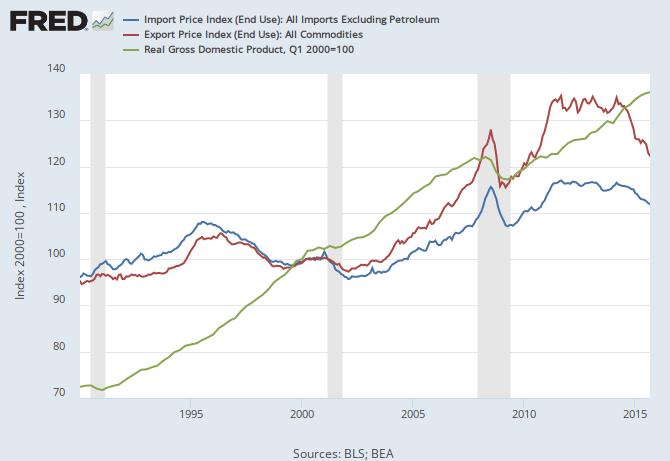Data is data. It is cold and lifeless – and it takes some understanding of dynamics affecting that data set to provide context. I see one data set that makes no sense.

Historically, trade not only tells the story of the health of the global economy – but also shows the health of the individual economies when one looks at the imports into and exports from that economy.
The graph below shows the imports (blue line) and exports (red line) for the USA – all indexed against GDP.

Here are the takeaways from this graph:
Although a lot of folks badmouth trade agreements (including this pundit in the past) – the export red line shows since 2000 USA exports have grown faster than imports (in fact almost twice as fast). It does appear that free trade agreements have helped the USA economy but there is no control element to understand if this is true. It could be that exports would have grown more without the free trade agreements?
On a real (inflation adjusted) basis, since 2000 GDP is up over 30%, imports up over 20%, and imports up over 10%.
Exports and imports are becoming less and less important to the USA economy (based on contribution to GDP).
For over a year both imports and exports have fallen dramatically. This is a historical flag for a recession. Imports tell a story of the health of the consuming class, and exports are related to the strength of the global economy.
Yet, despite the dramatic decline of exports and imports, there is no other indicator of a recession in the data I review. The dollar has strengthened, which would affect exports (as they would be more dear) – but on the other hand it should be a tailwind to imports (as they become cheaper). Yet both imports and exports are in decline. If the economy continues to muddle along even with this dramatic decline of exports and imports, this could further the evidence of the decline role of trade in the economy.
Still, all portions of the economy do not act in concert. One element can have an obvious recession while other elements are growing. In the event of a recognized recession, one element almost always seems to indicate first. Could this be the first indication?





